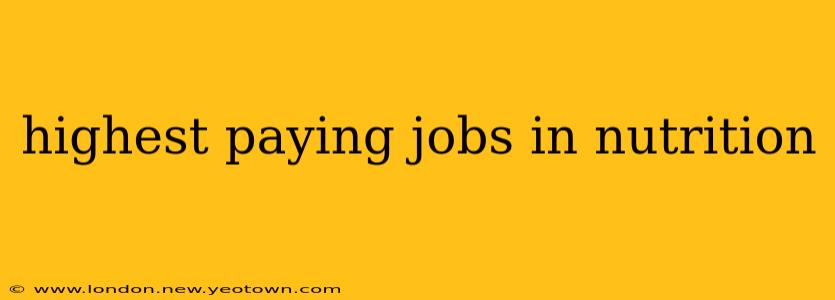The world of nutrition is booming, driven by a growing awareness of the link between diet and overall well-being. But while passion for healthy eating is essential, let's be honest: financial security is also a critical factor. This journey will explore some of the highest-paying jobs in the nutrition field, revealing the paths you can take to both make a difference and build a thriving career. We’ll go beyond simply listing titles, delving into the required education, responsibilities, and the factors that influence earning potential.
What are the Highest Paying Nutrition Jobs?
The highest-paying nutrition jobs often require advanced education and specialized skills. Think less "nutritionist" and more "specialized expert." While a basic registered dietitian (RD) role provides a solid foundation, reaching the higher echelons demands further dedication and expertise. Let's explore some top contenders:
1. Registered Dietitian (RD) in Specialized Areas:
While a general RD role is respectable, specializing significantly boosts your earning potential. Areas like:
- Pediatric Nutrition: Working with children and families on growth, development, and dietary needs. The emotional rewards are immense, and specialized knowledge commands higher salaries.
- Geriatric Nutrition: Focusing on the unique dietary needs of older adults, addressing age-related issues, and improving quality of life. This field is experiencing significant growth.
- Sports Nutrition: Working with athletes to optimize performance through tailored nutrition plans. This often involves collaboration with coaches and trainers.
- Oncology Nutrition: Supporting cancer patients during treatment and recovery, managing side effects, and improving nutritional status. This field requires a deep understanding of cancer biology and its impact on nutrition.
These specializations require additional training and certifications beyond the initial RD credential, but the investment pays off in a higher earning potential.
2. Nutrition Research Scientist:
These professionals are at the forefront of discovering new knowledge about nutrition and its impact on health. They conduct clinical trials, analyze data, and publish research findings. This often involves a PhD in nutrition or a related field, and earning potential is significantly high, especially with experience in competitive research institutions or pharmaceutical companies.
3. Nutrition Manager/Director:
Large organizations, such as hospitals, healthcare systems, or food companies, often employ nutrition managers or directors. These individuals are responsible for overseeing large nutrition programs, managing budgets, and leading teams of dietitians and other professionals. Their expertise and managerial skills are highly valued, leading to a higher salary range.
4. Nutrition Consultant:
While individual earning potential varies greatly, highly experienced and sought-after nutrition consultants with specialized expertise (like sports nutrition or weight management) can command high fees for their services. Building a successful consultancy requires marketing acumen and a strong professional network.
5. Public Health Nutritionist:
Working to improve the health and well-being of populations through programs and initiatives that promote healthy eating habits. While the starting salaries might be lower than some others listed, government and non-profit positions often offer excellent benefits and growth potential.
Frequently Asked Questions (FAQs)
What education is needed for high-paying nutrition jobs?
Most high-paying nutrition jobs require at least a Master's degree, often in a specialized area of nutrition. A PhD is often required for research positions or advanced leadership roles.
How can I increase my earning potential in nutrition?
Continuous professional development, specializing in a high-demand area, building a strong professional network, obtaining advanced certifications, and gaining experience in high-paying settings are all vital factors.
What are the job prospects in the nutrition field?
The job outlook for nutrition professionals is very positive, driven by growing public awareness of health and wellness. The demand for specialized expertise is particularly strong.
What are the differences between a dietitian and a nutritionist?
The term “dietitian” is legally protected, requiring specific education and licensure. Nutritionist is a broader term, and its usage and regulations vary by state. Dietitians generally have a higher level of education and scope of practice.
How do I become a registered dietitian (RD)?
Becoming an RD involves completing a supervised dietetic internship and passing a national exam. The specifics of the educational requirements may vary slightly by state.
This exploration of high-paying nutrition jobs should serve as a roadmap for ambitious individuals. While the journey requires dedication and hard work, the rewards—both financial and in terms of impacting people's lives—are substantial. Remember that networking, continuous learning, and specializing in a high-demand area are keys to unlocking the highest earning potential in this rewarding field.

